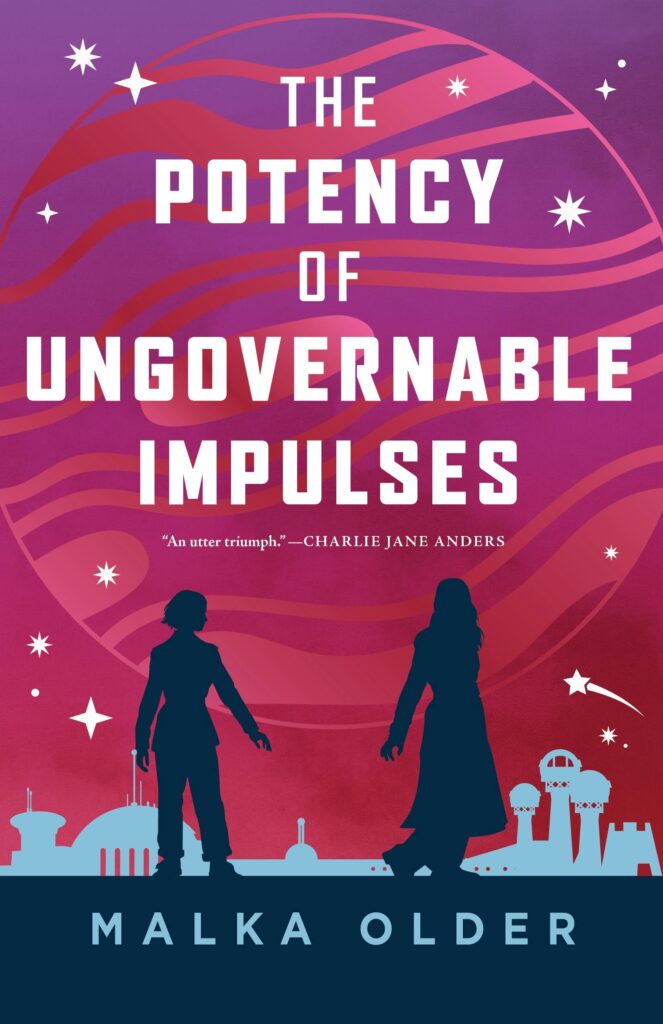Book Review: The Potency of Ungovernable Impulses, by Malka Older

Malka Older makes a rousing return to her acclaimed SF mystery/romance series, The Investigations of Mossa and Pleiti, with The Potency of Ungovernable Impulses, coming out June 10. The novella that started the series, The Mimicking of Known Successes, was amazingly great (I reviewed it here), and I quite enjoyed the sequel, The Imposition of Unnecessary Obstacles. The latest book is the longest so far, but at 256 pages it feels just right. The mystery seems to have lower stakes than in previous books, but it also highlights previously unexplored aspects of the Giant (Jovian) society and returns to some elements of previous books that hadn’t exactly been resolved after all. The romance between Pleiti and Mossa undergoes some severe friction, but in the end … well, read it and see! I don’t advise jumping into the latest book if you’re new to Mossa and Pleiti; start with the first novella, since the relationship and the worldbuilding are complex and continue to develop throughout the series. However, it’s not necessary to reread the earlier works to pick up the series again at this point (especially if you’ve already reread in the intervals like me), since Older includes plenty of reminder-references and context clues to prior situations. (I think if you skipped the second book for whatever reason, you can still read the third without too much difficulty.) The Potency of Ungovernable Impulses opens with a prologue of Mossa lurking outside Pleiti’s quarters, oddly reluctant to enter. The action starts in Chapter 1 with Petanj, an old Valdegeld University schoolmate, asking Pleiti for help; Petanj’s cousin Villette, a rising scholar-star at rival Stortellen U. who’s scheduled to be honored soon with a donship that’s relatively early in her career, has been receiving nasty anonymous notes and a false accusation of plagiarism. Petanj thinks that Pleiti, as a fellow scholar, will be less official, less intimidating, and more familiar with academic environments than Investigator Mossi, but hopefully familiar enough with the investigative process (given Pleiti’s somewhat notorious participation in prior investigations) to help resolve this problem and growing scandal. Pleiti asks Mossi to investigate with her anyway, or at least consult with her, but Mossa, sunken into a deep apathy or worse, refuses to even listen to the case, and sends Pleiti away. For much of the book, Pleiti doesn’t see Mossa, and frequently asks herself What Would Mossa Do as she embarks on the investigation, wondering whether she should have stayed with Mossa instead to help lift her spirits, since she doesn’t seem to be making much progress as she chats with various associates of Villette (pretending to be a mere curious visitor who’d come for the donship ceremony). Libel escalates to sabotage and worse, but the university leadership is more inclined to blame Villette as a trouble-inciter than to find the culprit(s?). In many ways, this book reminds me of the wonderful academic mystery/romance Gaudy Night (1935), by Dorothy Sayers. In that, Harriet Vane, a mystery novelist, is asked to investigate various “poison pen” notes at her alma mater, a women’s college at Oxford; she begins to feel out of her depth when the attacks move from libelous taunts to violence, and writes about the case to her unsuccessful suitor, the famous detective Lord Peter Wimsey. The Potency of Ungovernable Obstacles doesn’t address women’s roles in society the way Gaudy Night does, since the Jovians of the future appear to have moved beyond that (although I note that the highest leaders of both universities here are men). And Potency doesn’t address clashes between town and gown mindsets the way Gaudy Night does (although Imposition touched on that lightly), but it does talk quite a lot about the different, and sometimes opposite, mindsets of the Classicists (studying Classic pre-Giant works in order to try to reconstruct a sustainable biosphere for ruined Earth) and the Modernists (focusing on life here and now on the orbiting rail-ring platforms around Giant/Jupiter). Distant from Valdegeld, the Stortellans have heard little more than vague rumors about the stirring events from the climax of The Mimicking of Known Successes, and some of them wonder whether the conspiracy there may have been much wider-reaching than the news said — which sets Pleiti to wondering whether she and Mossa really had gotten all the culprits; certainly the major perpetrator there had a lot of sympathizers. As Pleiti confesses late in Potency, she has much less faith now in leaders and institutions than she used to have. Eventually, Pleiti finds her own way to analyze the case and come to a conclusion; eventually, she gets some more help, and the mystery is solved, although not without some collateral damage along the way. Obviously I don’t want to spoil the perpetrator or the motives here, so I can’t talk about the resolution much. However, on a side note, I did feel pleasantly vindicated when I was vindicated in my guess about a romantic subplot. For the major romantic plot, both Mossa and Pleiti both struggle a lot with their feelings of inadequacy, and their tendencies to hurt each other with inadvertencies, occasional emotional obtuseness, and even efforts to shield each other from harm. Somehow, Malka Older manages to write this in a way that mostly has me sympathetically groaning “Oh, Mossa” or “Oh, Pleiti” instead of snarling, “Oh, come ON!” Mostly. But they do, eventually, communicate better. (And the book isn’t all grim and moody! There’s a lot of snide humor, and comfort food, and some exciting action!) Speaking of communication, I’ll mention the word choices here. Language on the platform is an evolving thing, which is natural for a society of Earth refugees thrown together and mixing and building a new way of life together around another world. In this future, numerous words have crossed over from other languages into English (or whatever language the future story has been translated from into our 21st-century usages, ha!), and various words have evolved via dropping prefixes or suffixes, or adding new
Book Review: THE BUFFALO HUNTER HUNTER by Stephen Graham Jones

Jones gives each of the three main characters of the novel an exceptionally personalized voice. A large part of what captivated me through the pages was his remarkable ability with the flow of words through a diversity of styles, a variation in ways that stories can be told.
Shaun’s Rambles 007: On Teaching Science Fiction — The Reading List
http://media.blubrry.com/skiffyandfanty/dts.podtrac.com/redirect.mp3/archive.org/download/ShaunsRambles007OnTeachingScienceFictionTheReadingList/ShaunsRambles007–OnTeachingScienceFiction–TheReadingList.mp3Podcast: Play in new window | DownloadSubscribe: Apple Podcasts | Spotify | Android | iHeartRadio | Podchaser | Podcast Index | Email | TuneIn | Deezer | RSSHow do I select what I teach in my science fiction courses?

